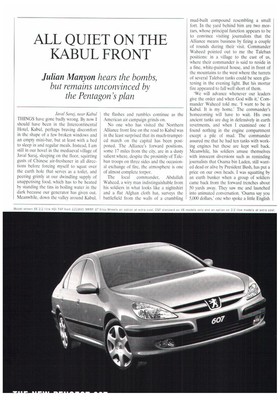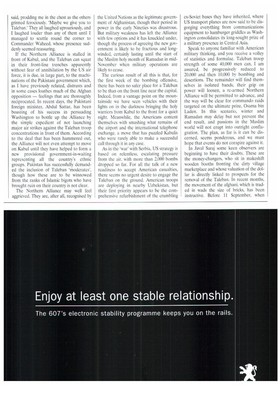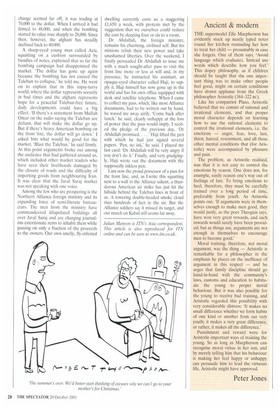ALL QUIET ON THE KABUL FRONT
Julian Manyon hears the bombs,
but remains unconvinced by the Pentagon's plan
Java! Saraj, near Kabul THINGS have gone badly wrong. By now I should have been in the Intercontinental Hotel, Kabul, perhaps braving discomfort in the shape of a few broken windows and an empty mini-bar, but at least with a bed to sleep in and regular meals. Instead, I am still in our hovel in the mediaeval village of Javal Saraj, sleeping on the floor, squirting gusts of Chinese air-freshener in all directions before forcing myself to squat over the earth hole that serves as a toilet, and peering grimly at our dwindling supply of unappetising food, which has to be heated by standing the tins in boiling water in the dark because our generator has given out. Meanwhile, down the valley around Kabul, the flashes and rumbles continue as the American air campaign grinds on.
No one who has visited the Northern Alliance front line on the road to Kabul was in the least surprised that its much-trumpeted march on the capital has been postponed. The Alliance's forward positions, some 17 miles from the city, are in a dusty salient where, despite the proximity of Taleban troops on three sides and the occasional exchange of fire, the atmosphere is one of almost complete torpor.
The local commander, Abdullah Waheed, a wiry man indistinguishable from his soldiers in what looks like a nightshirt and a flat Afghan cloth hat, surveys the battlefield from the walls of a crumbling mud-built compound resembling a small fort. In the yard behind him are two mortars, whose principal function appears to be to convince visiting journalists that the Alliance means business by firing a couple of rounds during their visit. Commander Waheed pointed out to me the Taleban positions: in a village to the east of us, where their commander is said to reside in a fine, white-painted house, and in front of the mountains to the west where the turrets of several Taleban tanks could be seen glistening in the evening light. But his mortar fire appeared to fall well short of them.
'We will advance whenever our leaders give the order and when God wills it,' Commander Waheed told me. 'I want to be in Kabul. It is my home.' The commander's homecoming will have to wait. His own ancient tanks are dug in defensively in earth revetments, and when I examined one I found nothing in the engine compartment except a pile of mud. The commander assured me that he had ten tanks with working engines but these are kept well back. Meanwhile, his soldiers amuse themselves with innocent diversions such as reminding journalists that Osama bin Laden, still wanted dead or alive by President Bush, has put a price on our own heads. I was squatting by an earth bunker when a group of soldiers came back from the forward trenches about 50 yards away. They saw me and launched into animated conversation. `Osama say you 5,000 dollars,' one who spoke a little English said, prodding me in the chest as the others grinned ferociously. 'Maybe we give you to Taleban.' They all laughed uproariously, and I laughed louder than any of them until I managed to scuttle round the corner to Commander Waheed, whose presence suddenly seemed reassuring.
If the Northern Alliance is stalled in front of Kabul, and the Taleban can squat in their front-line trenches apparently without fear of annihilation by the US air force, it is due, in large part, to the machinations of the Pakistani government which, as I have previously related, distrusts and in some cases loathes much of the Afghan opposition — feelings that are thoroughly reciprocated. In recent days, the Pakistani foreign minister, Abdul Sattar, has been boasting of his success in persuading Washington to bottle up the Alliance by the simple expedient of not launching major air strikes against the Taleban troop concentrations in front of them. According to the deal that has been hammered out, the Alliance will not even attempt to move on Kabul until they have helped to form a new provisional government-in-waiting representing all the country's ethnic groups. Pakistan has successfully demanded the inclusion of Taleban 'moderates', though how these are to be winnowed from the ranks of Islamic bigots who have brought ruin on their country is not clear.
The Northern Alliance may well feel aggrieved. They are, after all, recognised by the United Nations as the legitimate government of Afghanistan, though their period in power in the early Nineties was disastrous. But military weakness has left the Alliance with few options and it has knuckled under, though the process of agreeing the new government is likely to be fractious and longwinded, certainly lasting until the start of the Muslim holy month of Ramadan in midNovember when military operations are likely to cease.
The curious result of all this is that, for the first week of the bombing offensive, there has been no safer place for a Taleban to be than on the front line near the capital. Indeed, from a vantage point on the mountainside we have seen vehicles with their lights on in the darkness bringing the holy warriors from Kabul to the front for a quiet night. Meanwhile, the Americans content themselves with smashing what remains of the airport and the international telephone exchange, a move that has puzzled Kabulis who were rarely able to make a successful call through it in any case.
As in the 'war' with Serbia, US strategy is based on relentless, escalating pressure from the air, with more than 2,000 bombs dropped so far. For all the talk of a new readiness to accept American casualties, there seems no urgent desire to engage the Taleban on the ground. American troops are deploying in nearby Uzbekistan, but their first priority appears to be the comprehensive refurbishment of the crumbling ex-Soviet bases they have inherited, where US transport planes are now said to be disgorging everything from communications equipment to hamburger griddles as Washington consolidates its long-sought prize of a military presence in Central Asia.
Speak to anyone familiar with American military thinking, and you receive a volley of statistics and formulae. Taleban troop strength of some 40,000 men can, I am assured, be progressively reduced to 20,000 and then 10,000 by bombing and desertions. The remainder will find themselves in isolated bands, their grip on power will loosen, a re-armed Northern Alliance will be permitted to advance, and the way will be clear for commando raids targeted on the ultimate prize, Osama bin Laden. In this scenario, winter and Ramadan may delay but not prevent the end result, and passions in the Muslim world will not erupt into outright conflagration. The plan, as far is it can be discerned, seems ponderous, and we must hope that events do not conspire against it.
In Javal Saraj some keen observers are beginning to have their doubts. These are the money-changers, who sit in makeshift wooden booths fronting the dirty village marketplace and whose valuation of the dollar is directly linked to prospects for the removal of the Taleban. In recent months, the movement of the afghani, which is traded in wads the size of bricks, has been instructive. Before 11 September, when change seemed far off, it was trading at 70,000 to the dollar. When I arrived it had firmed to 48,000, and when the bombing started its value rose sharply to 28,000. Since then, however, the afghani has steadily declined back to 40,000.
A sharp-eyed young man called Aziz, squatting on a cushion surrounded by bundles of notes, explained that so far the bombing campaign had disappointed the market. 'The dollar has gone up again because the bombing has not caused the Taleban to collapse,' he told me. He went on to explain that in this topsy-turvy world, where the dollar represents security in bad times and the afghani represents hope for a peaceful Taleban-free future, daily developments could have a big effect. 'If there's a statement from Mullah Omar on the radio saying the Taleban are defiant, that will make the dollar go up. But if there's heavy American bombing on the front line, the dollar will go down.' I asked him what would be good for the market. 'Blast the Taleban,' he said firmly. At this point arguments broke out among the audience that had gathered around us, which included other market traders who have seen their livelihoods damaged by the closure of roads and the difficulty of importing goods from neighbouring Iran. It was clear that the Javal Saraj market was not speaking with one voice.
Among the few who are prospering is the Northern Alliance foreign ministry and its expanding force of semi-literate bureaucrats. The men from the ministry have commandeered dilapidated buildings all over Javal Saraj and are charging journalists extortionate rents to inhabit them while passing on only a fraction of the proceeds to the owners. Our own smelly, fly-infested dwelling currently costs us a staggering £1,650 a week, with protests met by the suggestion that we ourselves could reduce the cost by sleeping four or six to a room.
Dr Abdullah, the foreign minister, remains his charming, civilised self. But his minions relish their new power and take unashamed liberties. Over the weekend, I finally persuaded Dr Abdullah to issue me with a much sought-after pass to visit the front line more or less at will and, in my presence, he instructed his assistant, an opaque-eyed character called Haji, to supply it. Haji himself has now gone up in the world and has his own office equipped with desk and satellite telephone. When I came to collect my pass, which, like most Alliance documents, had to be written out by hand, he waved me away airily. 'Come back after lunch,' he said, clearly unhappy at the loss of power that the pass would imply. I recited the pledge of the previous day, 'Dr Abdullah promised. . 'Haji lifted the pen with which he had just signed several papers. 'Pen, no ink,' he said. I played my last card: 'Dr Abdullah will be very angry if you don't do it.' Finally, and very grudgingly, Haji wrote out the document with the supposedly inkless pen.
I am now the proud possessor of a pass for the front line, and, as I write this squatting next to a wall in the Alliance salient, a thunderous American air strike has just hit the hillside behind the Taleban lines in front of us. A towering double-headed smoke cloud rises hundreds of feet in the air. But the Alliance soldiers say it missed its target, and our march on Kabul still seems far away.
Julian Manyon is ITN's Asia correspondent. This article is also reproduced for ITN online and can be seen at wwwitn.co.uk.




























































































 Previous page
Previous page